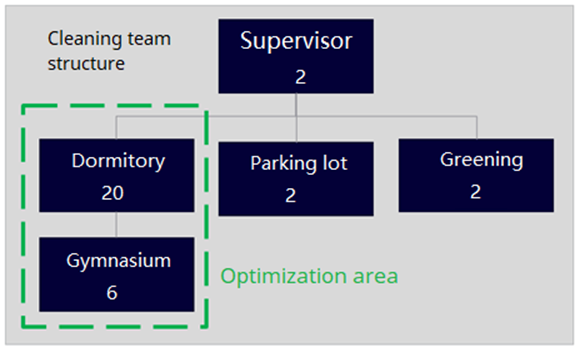City life is full of pressure and challenges. People want to work, shop and live in a clean, comfortable and relaxing environment, and clean places are the basis of all this.
Whether it is large public place, office buildings and factories, or schools and campuses, all need the facility management team to provide professional and creative solutions that can realize low cost, high efficiency, superior quality of account operation.
Cleaning may not seem technical but improving service efficiency is what ISS pursuing for over a century.
SIM@ISS system to improve productivity
Based on the customer's needs, SIM@ISS system is able to assess the current situation, collect and analyse data, conduct site inspection and continuously implement process improvement. Leveraging the system, we can quantitatively analysis service efficiency to optimise working hours and save material and energy consumption, reducing costs and increasing efficiency for customers.
Case study of a school
First of all, from the perspective of customers, we find out the needs and ideal results. By analyzing the layout of buildings on campus, defining the scope of work, the headcount and periodic cleaning tasks, we use SIM@ISS system to calculate the actual workload and match it with the current situation, formulating an efficiency optimization plan.

Combined with the system calculation and the actual situation, we found that the staff scheduling of teaching buildings, dormitories and gymnasium can be optimized, and the potential optimization space of working hours per day can reach up to 60 hours, and the cleaning efficiency will be increased from 344㎡/h to 473㎡/h.
Action taken:
1. Add middle shift to reduce the overtime after morning shift
2. Adjust the frequency of cleaning
After further analysis, we expected the optimization results will be achieved:
Based on the overtime hours in the past nine months, the average monthly overtime pay is ¥34,026, which is 37% more than what the SIM@ISS system predicts.
By reallocating and rescheduling placemakers, it is expected to save ¥12,684 per month.
From March to December this year, it is expected to save ¥126,840 in overtime hours.
When quantitatively managing the tedious cleaning work, it is more important for managers to "tailor" the cleaning work and to identify and solve problems through quantitative methods, by optimising working hours, we aim to reduce costs and increase efficiency for customers and create a more comfortable and pleasant workplace.
About ISS China
Founded in Denmark in 1901, ISS is a leading workplace experience and facility management company. ISS has been developing in China for more than 15 years. In China, nearly 10,000 ISS placemakers are located in more than 80 cities across the country, providing comprehensive services including cleaning, security, engineering, workplace experience, catering and other services for financial services, technology, manufacturing, education, life science, healthcare and other industries. ISS provides placemaking solutions that contribute to better business performance, better workplace experience and makes life easier, more productive and enjoyable. For more information, visit ISS China.

